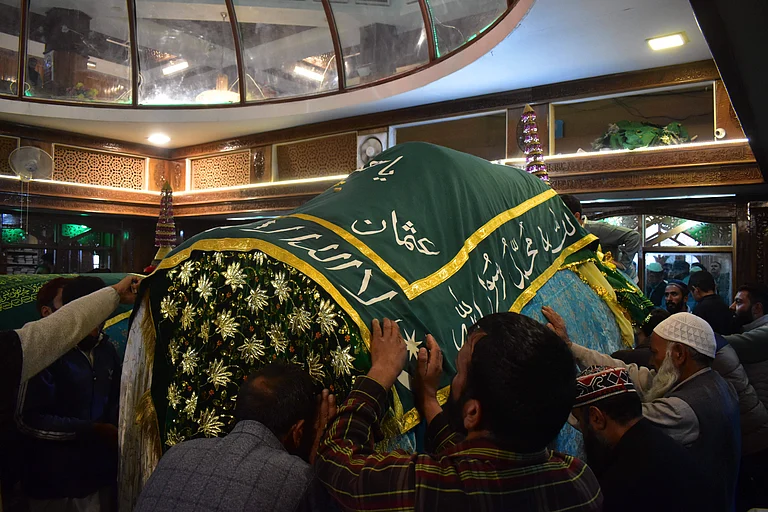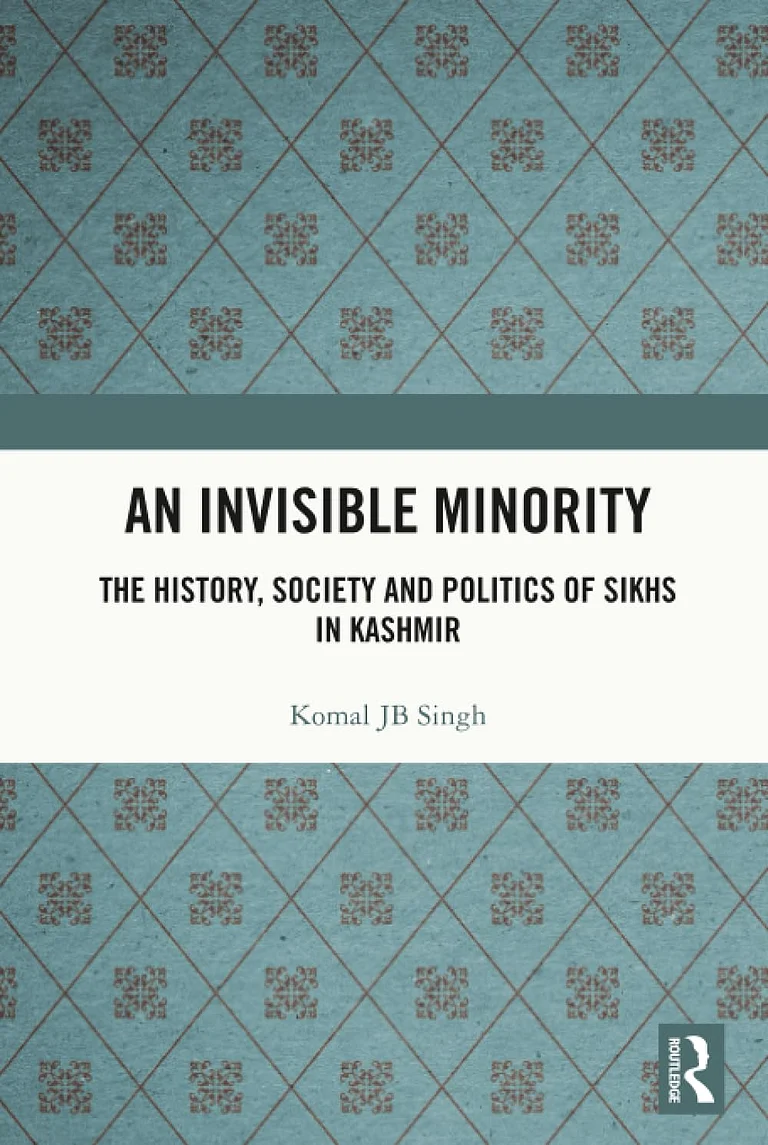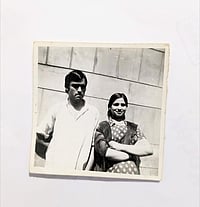"There is life and there is death, and there is beauty and melancholy in between." - Albert Camus
August 2015
He keeps my copy of The Magic Mountain for a month and one fine evening invites me for a cup of tea. This is my favorite part of the book. Settembrini’s discourses on life. He starts reading a paragraph, ‘We’ve to honor and uphold the body when it’s a question of emancipation, of beauty, of freedom of thought, of joy, of desire. We must despise it in so far as it sets itself up as the principle of gravity and inertia, when it obstructs the movement toward light; we must despise it in so far as it represents the principle of disease and death, in so far as its specific essence is the essence of perversity, of decay, sensuality and shame.’
October 2022
I got a call. "Which route should I follow, the new highway or the old one? I'm taking Mom Dad to Patnitop. We're here. It's a beautiful hill station. It looks like home, Kashmir. We will also go to Udhampur, to the house where we stayed for ten years after our forced exodus. I'll take him to the college where he taught, to the Devika temple too."
June 2016
I'm reading from the pages of Thus Spoke Zarathustra at his place. I do this every time I buy a new book. It’s a ritual. He talks about Nietzsche. He narrated an incident that caused him seizures. I remember him talking about the Turin horse story. The other day he talked about Crime and Punishment, about Raskolnikov's horse dream. "What about any remaining desires? What do you need for the rest of your life? All I need is mounj haakh and curd."

August 2017
I'm reading from Report to Greco. I share my excitement of reading the entire book in a week and finding it as one of the best I've read till now. It's powerful; the author is always struggling with soul and flesh. He agrees and walks towards his bedroom and shows me his notes on the book, every important excerpt, quote written over the pages, a sort of review, written some forty years ago. Notes on Zorba the Greek. He shares that he bought a copy of Camus"The Stranger" for two rupees at the Srinagar book shop. He suggested that I watch the movie The English Patient. He mentions Alfred Hitchcock's 1963 movie The Birds.
September 27, 2024 (the day he was cremated)
I turn the pages of your essay. I found it in one of the books you had gifted me. One of the pages read, "The cigarette shouted, “You devil you have conquered the worlds but you have never been victorious. You have counted your heartbeats a million times. I have seen you die in infancy, in youth and in old age. Yet you always wanted to live. You have preferred the transient to the eternal. Your birth has been your death. You coward, why do you veil confession?” I said, “In your loneliness I see my own suffering. My life is a gamble and a mistake. I wish I could see my own death the way you see yours.” “But you delight in the burial of truth and honesty,” came the reply. Again I said, “Clasp, take me into your arms. You are the one who stands for truth. Remould me and teach me not to run from myself. I have broken into tiny fragments.” The reply came as if from a far off place. “You have lost your memory. You have annihilated your true self. Thus you have always suffered. And you will always suffer.” I pondered over the futility of my life. No solace. No joy. No love. Falsehood and untruth. This I am. This alone I am. I still am; I am not still."
A child in an old man and an old man in a child. Your laughter still resounds in my ears. My friend, Guru passed away at the age of 79. A man of great scholarship and immense knowledge. An intellectual giant, renowned teacher of English language, noted academician, writer, editor, reviewer translator, author of popular books of cameos. The Ugly Kashmiri is comic and profound. The cameos on the condition of Kashmiri Pandits in exile sum up the agony of the displaced Kashmiri Pandit community. Pathos, satire, irony, history. Killings, death, mayhem, loot, plunder and displacement. His letters to Kashmiri Pandits and his diary entries from 1989 to 1990 are a witness to what the Pandit community faced in Kashmir and endured in exile.
2013
I finished reading The Garden of Solitude and rang Siddhartha.
2014
I'm in Jammu. I'm looking for his house. It's in our immediate neighborhood. I'm warmly received. "Sushant, meet my father Prof Arvind Gigoo". We exchange a firm handshake and here I get introduced to this illustrious family of Kashmiri Pandits from Safakadal Srinagar. Over the years, I am astounded by his magnetic charm and engaging conversations. He celebrated life and lived on his own terms and choices. "hay boznav sa kehya yemsaeth dil khoush gasye"(talk about something which makes my heart happy).
Our conversations revolve around time, tedium, reason, enlightenment, death and free will. I became a frequent visitor to their place, every evening or now I used to be there, conversations ranging from literature, cinema, music, people, politics and Kashmir.
The years spent in Udhampur. Books, movies, artists, characters, authors. Settembrini, Pepperkorn, Hans Castorp, Chauchat, Raskolnikov, Alyosha, Remedios, Dmitri. Dali, Vincent van Gogh. Schopenhauer, Kazantzakis, Bergson, Mann, Camus, Ramana Maharshi, Dayanand Saraswati, Hitchcock. Kath Upanishad. Ben Hur, Beckett, The Great Escape, Prison of Alcatraz, Lawrence of Arabia, Guns of Navarone, One Flew over the Cuckoo's Nest, The Lion in winter, The Shining, Papillon, Bicycle thief, The Last Temptation of Christ, Zorba the Greek, Twelve Angry men, To Kill a Mockingbird, Roman Holiday. Romain Rolland, Marlon Brando, Steve McQueen, Peter o Toole, Dustin Hoffman, Jack Nicholson. I got to know about European literature from him. He was a modernist and a fine sculptor. His story The Red Kite and Steel Trunk is gut wrenching. He introduced me to Dostoevsky and Herman Hesse. He was working on the writings of Lal Ded for the past twenty years. I've read his essay Thus spoke cigarette numerous times. He loved cigarettes, beer and whiskey. His book The Ugly Kashmiri is a magnum opus, a great commentary on Kashmir and its inhabitants (past and present). He went silent for the last two years.
On asking why he's silent nowadays, he used to say ' everything has been said, there's nothing to say, all talk has been finished.""kath makleye". He was a great friend. A man of extreme humility and dignity. He always encouraged me to send my work to different literary magazines. I always informed him about the acceptance of my work as well as rejection emails. He advised me to not worry about rejections and to keep writing, a sentence a day, a page a day, and to keep on writing.
A few years ago, he packed all his books and sent them to the Kolkata library and some of his collection of books to his son in Delhi. He showed me all his family photographs from Kashmir and other photo albums. He felt at peace at his Jammu home. He didn't like going to Delhi but for old age and illness. He gave me many books.
He had one word for everything that he saw, read, watched, talked about, "Beautiful". Many Kashmiri Pandit writers would come to his house for his help in proofreading, editing their books. He told me many incidents/stories from his years in Kashmir. He was an admirer of film actor Dilip Kumar. He had met him at his friend's place in Kashmir. One day while visiting his friend's place, he was introduced to a man standing in the garden; the man shaked his hands, "barkhudar kya haal hai apke". After leaving the place, he enquired about the man from his friend who replied that the man wearing a black suit with which he exchanged greetings was Dilip Kumar. He also met Balraj Saini, used to interact with M F Hussain at coffee shop Srinagar. Not many know he was a great actor, I have seen his acting prowess first hand, he enacted a scene of a drunkard in front of me many times. He was a sharp observer of the human mind.
February 2024
He has been diagnosed with a neurological ailment. Prostate surgery was done. Doctors are suggesting spinal tap to remove excess CSF. It's Hydrocephalus.
September 22, 2024
Siddhartha informs me that they're planning to come to Jammu in the month of October for pension verification. I visited him at the Hotel in the evening of September 22. He was in bad shape. I couldn't believe my eyes. I regretted seeing him. His attendant helped him to get off the bed. He sat on the sofa adjacent to me. He looked at me and enquired about the well being of me and my parents. I said, "What has happened to you Uncle you've transformed into something else, in less than a year you've become so thin, unrecognisable". He replied "Life, Life, that's it". I hurriedly left the place as he started having his dinner. We exchanged a firm handshake. I was disturbed.

Next Day
The home is getting cleaned. We are standing outside his house ruminating on life and its purpose. I take Aunty to my home for tea. We go for coffee at the Dayal Coffee house. Siddhartha shows me a book cover. Interpretation of Lal Ded. It's a beautiful cover. The book is forthcoming. It's been with the publisher for the past one year. He was working on Lal Ded for the past twenty years, he had once shown me the notes in loose binding, some pages here and there, some transcribed on the word document, and aunty insisted on him every day or the other to finish this work. I'm told the book will be published by OM Books International in a month or two.
September 24
They leave Jammu in a hurry. I reached the hotel at 6:30 pm. His friends are outside. They informed me that his condition was pathetic. They've left for the airport.
Two hours later
His condition has worsened. We took him to the hospital. He's unwell. Doctors shifted him to MICU. BP went 70/40. All the vitals have gone haywire. Doctors are keeping a tab. They aren't allowing anyone there. Aunty is worried. A message pops up on my whatsapp, "I burnt him today".
I spoke to his friends and students from the literary community. They are shocked to hear about his sudden demise.
Adarsh Ajit (author and reviewer)
I look back at my relation of thirty four years with him. I'm shattered. It feels that I have once again lost my father. He was a remarkable philosopher and teacher. Everybody cherished his company. Cutting jokes, letting his achievements be ignored, laughing at his own mistakes and follies, behaving as if he knew nothing. I loved him.
Ramesh Tamiri (noted ophthalmologist and chronicler of Kashmir history)
Prof Arvind was a colossus and a great human being. Despite failing vision, he edited my entire manuscript, covering all three sections on the Pakistani invasion of J&K 1947-48. He was one of the best practitioners of the English language. He was outspoken and never afraid to speak his views. He was a competent translator and good editor. He hated hypocrisy and would advise against describing people as geniuses and legends. He hated flattery and respected friendship. His knowledge was encyclopaedic. He could discuss anything and had great stories to tell about the events of history. Like George Bernard Shaw he believed that language is meant for communication. It should be simple and intelligible to the reader. His passing away is a great loss for all.
Maharaj Santoshi (award winning Hindi writer)
How hurtful it is to imagine that Arvind Gigoo is n more! He was my teacher at Anantnag Degree College. His way of teaching was performing, not lecturing. His literary work inspired us. I first read his poem in the Verinag Magazine. It filled me with the will to live. The poem ends with this sentence, "Be happy, Spit at the world." I felt like I've found the reason to live, the thread to work upon. Many years later I wrote a poem and sent it to him; he improved it and made it more readable. It's the only poem I've written in English. He translated the Hindi poems of many Kashmiri writers to English. He blessed me by translating my work in Hindi to English. He was a man as well as a writer of few words and small sentences. His book The Ugly Kashmiri started a new genre in the publishing world. I was in love with his simplicity, honesty and humour. He was a Zen Buddha for me. I'll miss him forever.
Monika Kaul (Delhi based artist)
I was his student at the Udhampur Degree College. He was a rare convergence of complexity and simplicity, like the paradoxes he so often unraveled. His mind, a labyrinth of thought, was not built to be understood at first glance. Yet, within his maze of ideas, there was a quiet invitation for those who dared to wander. He never forced knowledge upon you; he simply stood as a lighthouse. As a teacher, he was more of a mirror than a map. But beyond his intellect was a soul marked by selflessness, a rare generosity of spirit. He didn’t just share knowledge—he shared himself. His influence lingered like the echo of a profound sentence, the kind that changes not just how you think, but how you live. He was not just a guide, a teacher, or a philosopher. He was a friend who helped you see the beauty in struggle, the grace in complexity, and the extraordinary in the ordinary. His legacy will always rest in the depths of our hearts.
Pratush Koul (a young writer)
I remember the evenings spent with him. He was an aficionado of good films, paintings and hearty conversations. His calm and friendly persona and a welcoming aura made me fall in love with him. Every time I visited his place it felt like I was going to meet my grandparents. He always introduced me as his friend. On my evening walks I always stopped by for a coffee at his place. His voice would echo in the room and make all the listeners transfixed. I remember how he would sneakily eat a sweet biscuit without letting aunty know. I will miss his childhood innocence and his affectionate smile and infectious laughter. I walked past that lane yesterday. The gate is locked. I yearn for your ‘aur sunao betey’. You are still there, resting on that sofa, having your evening tea, waiting for a friend to come by and say hello. I can’t enter through the gate. The keys to the house are now lost in time.
The Gigoo house in Jammu wears a deserted look. A lock hangs on the main door for the past one year. It’s the same place where I have spent countless evenings. I woke up the next morning and ran towards the house. Time stands still. Everything feels like a dream. I gathered courage and kept flowers on the nameplate, my hands are shivering while I keep a garland of flowers on the top of the gate. I remembered the last ten years spent with him, the animated conversations, reading from the books, watching movies, revising, editing short stories, everything and nothing. I wished him a final goodbye on his birthday and the day of his cremation. September 27. My question to him still remains unanswered, Can Man ever reconcile with Death?























